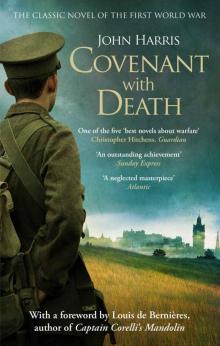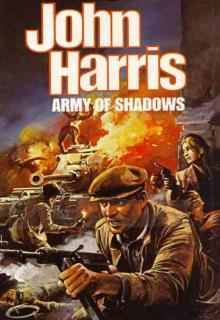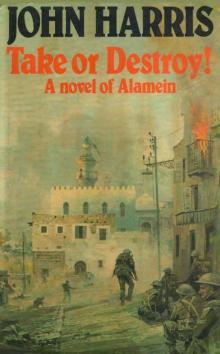- Home
- John Harris
Fox from His Lair Page 6
Fox from His Lair Read online
Page 6
Hardee reached into a drawer and drew out a brown file, which he laid on the desk in front of him. He smiled apologetically. ‘It isn’t much. The only reason we think our man might be your Fox is because he’s not a civilian recruited by blackmail but a professional German officer who worked in Austria before the Anschluss, and in Prague before they went into Czechoslovakia. He also speaks excellent Polish and was in Warsaw when it fell. After that he’s believed to have joined Polish officers as they fled from Poland in 1939. He reached Egypt that same year and eventually England.’ Hardee took out a photograph and laid it in front of them. It showed a German officer complete with high-peaked cap, flyaway breeches, polished boots and stiff collar.
‘Ebert Klaus Reinecke.’ Hardee tapped the file. ‘Also known as Hans-Heinrich Müller; Franz-Karl Dittli; Adolf Matajec; Jan Chlebowski; Jean-Pierre de Leone; Walter MacMaurice; Padraic Seamus O’Shea; Arthur Jones; and Thomas John Dent.’
‘He gets around some,’ Iremonger commented.
‘Born Hanover, 1902. Joined army in 1918, aged 16. Decorated in World War I with Iron Cross, second class, and three months later with the Iron Cross, first class. So he’s not short of courage. Seconded to Intelligence in late twenties. Employed in Austria, Czechoslovakia and Poland. Gained a Knight’s Cross outside Warsaw. The rest you’ll find in there.’
Pargeter glanced at the picture. The German officer’s features were thin and indeterminate and he appeared to be laughing and pointing at the camera. Hardee leaned over the desk. ‘When we go into France,’ he said, ‘we have to expect heavy casualties – perhaps even very heavy casualties – but we must do everything in our power to keep them within bearable proportions. It seems to me, therefore, that as of this moment, our German friend is probably the most dangerous man in England and that you have a very formidable task.’
Part Two
From a Check to a View
One
Hardee worked fast and a large detached house at the north end of Portsmouth, filled up to an hour or so before with American officers, was set at their disposal. Sergeant Weinberger and four men, two of them British because Pargeter had insisted that they should not all be American, had occupied it, and tables were erected and telephones installed.
Despite his slight frame and apparent casualness, Pargeter was possessed of the physical keenness of a demon, and the fact that they had their headquarters straight and ready to roll by evening was entirely due to him. Sergeant Weinberger looked at Iremonger in a daze.
‘Does that guy always spend as much energy as this on living, Colonel?’ he asked. ‘Because, if he does, he sure as hell deserves to die young.’
Iremonger grinned. A fair man, he had to admit that Pargeter was pretty fast off the mark.
‘Major Pargeter, Weinberger,’ he said, ‘like God, moves in a mysterious way, his wonders to perform.’
Weinberger scratched his head. ‘He sure is a funny little gadget, Colonel.’
The description seemed to fit Pargeter’s neat frame.
‘I shouldn’t underestimate him, all the same,’ Iremonger warned. ‘He’s tougher than he looks and when he moves into top gear he’s a lulu. He also has a great deal more natural cunning than appears on the surface so when he wears his please-may-I-leave-the-room look, just watch out.’
The first evening in their new headquarters was quiet and Iremonger was reading the paper, grinning all over his face. ‘Hardee certainly shoves things along,’ he said, tossing it to Pargeter.
On the front page was a picture of an American general complete with staff, six-guns and bull terrier, addressing a group of American soldiers. ‘General Patton talking to GIs during a tour of inspection of East Coast camps,’ the caption said. ‘The troops are to be visited tomorrow by the King.’
Sergeant Weinberger, who had appeared with an armful of files, leaned over Pargeter’s shoulder to look. ‘Your goddam newspapers have gotten so small you could fold ’em up and get ’em in your wallet,’ he observed. ‘How do they get everything into four pages?’
‘We’re noted for our terseness,’ Pargeter said.
As Weinberger vanished, rebuffed, Pargeter pushed forward the folder Hardee had given them. ‘Reinecke,’ he said.
Ebert Klaus Reinecke, the file revealed, was the only son of Karl Reinecke who as a major in 1916 had been awarded Imperial Germany’s highest award for gallantry, and as a major-general in 1940 had been killed at Sedan, one of the few senior German officers to die. His grandfather was a Colonel Heinrich Reinecke, who in 1870 had been one of the first soldiers to see Paris as the Prussian armies had arrived to invest it.
‘Our Reinecke,’ Pargeter went on, ‘seems to have had a flair for languages – including English and was ordered – note that, ordered – by the General Staff to join Intelligence. He became a field worker.’
‘That the lot?’ Iremonger asked.
‘Not quite. Married three times. First time in 1930 to a woman who died in childbirth, leaving a son. Second time in 1934 to a Viennese girl who was killed in a motor accident in 1938. Third time in early 1939 to Sabina-Christina Grubovius, an actress. Last-heard-of rank was lieutenant-colonel.’ Pargeter frowned. ‘Know what Reinecke means?’ he asked.
‘Do you?’
‘German’s one of my languages. It means “Reynard”, “Old Cunning”, “Brer Fox”. Probably explains why he calls himself “Fox” in English.’
As they talked, there was a knock on the door and, as it opened, Elizabeth Wint appeared. Pargeter’s jaw dropped.
‘What the devil are you doing here?’ he asked.
‘Just been posted,’ she smiled.
Pargeter turned to look at Iremonger, who was grinning all over his face. ‘I was told we had to have female staff for typing, filing, and so on, and since American dames are so goddam pushing, I guessed mebbe we ought to have an English one.’
While Pargeter was still staring, the telephone rang and Iremonger disappeared to his office. Pargeter turned and looked at Second Officer Wint.
‘Rather fancied a posting to the American forces,’ she explained cheerfully. ‘After all, no American walks, and they don’t expect their lady friends to walk either.’
‘They’re all sex mad,’ Pargeter said coldly.
She was infuriatingly unperturbed by his annoyance. ‘Not really. Mind–’ she shrugged – ‘I have to admit that if a girl adjusts a stocking in a cinema, every American in the place turns round. But they’re lavish with their Luckies and Camels, and at dances at American bases you get ice cream, coffee, doughnuts, and sugar in bowls.’
Pargeter sniffed. ‘They’re completely naive and quite gullible. Every prostitute in London these days claims to be Free French when they’re neither free nor French. What’s more–’ he ended in a bleat of indignation as though this last were the most heinous of their crimes ‘–they monopolise the taxis.’
She smiled. ‘Do you want the truth?’ she asked.
‘Why not? A little old-fashioned truth is always welcome.’
‘Right. I like them.’
They were working up to a monumental row when Iremonger slammed down the telephone next door and appeared in the doorway, scowling. ‘That was Security,’ he snarled. ‘They ran a routine check on those papers we took from that guy we found on the beach at Abbotsbury – Colonel Greeno, the last of the Bigot officers. There were fingerprints on ’em. Fingerprints that weren’t his.’
Frowning deeply, Iremonger stood at the window, his hands thrust deep into his pockets. His cigar was out but it rolled round in his mouth as he chewed fiercely on it.
‘That guy Greeno was the only one of those Bigot officers who’d taken the papers out of the packet,’ he was saying. ‘It would have to be him some bastard found, holding the goddam things in his hand.’
Pargeter blinked. He wore a bland urchin look as if he knew exactly how things were shaping. ‘Why was he holding them in his hand?’ he asked.
Iremonger turned. ‘What do you mean, why w
as he holding them in his goddam hand?’
Pargeter’s thin pale face was expressionless so that he looked like a small boy having his teacup read by a maiden aunt and determined to catch her out by giving nothing away. ‘Up to now,’ he said, ‘it was no business of mine. Now it is. I came out of France at Dunkirk and I also escaped from Greece in 1941, so I’ve seen quite a few drowned soldiers. But I never saw any of ’em holding anything in his hand. When a man’s drowning, he lets go.’
Iremonger frowned. There was something curiously smug about Pargeter. It implied experience against his own lack of experience, a knowledge of war against his own lack of knowledge, and a sort of sly delight in proving to people that he wasn’t such a fool as he looked.
‘What the hell are you getting at, you narrow streak of Limey whitewash?’ he growled.
Pargeter shrugged. ‘Can’t imagine why he had ’em in his hand at all,’ he said. ‘After all, what did he think he was going to do with ’em? Strike a match and burn ’em? In the sea?’ His eyes changed and became as hard as flint. ‘Somebody found that body, Iremonger – somebody who was expecting to find it. Like the E-boats, he was looking for it and he took those papers out of the plastic case, and studied them, and when he’d finished, he stuffed ’em in Greeno’s hand because he didn’t have time to get ’em back in the packet. He had to leave them there because, otherwise, we’d have known they’d been found and there’d have been an immediate alarm.’
He set out the facts in such a neat way Iremonger felt dim-witted. He scowled because he knew Pargeter was right. ‘There were only Americans and British on that beach,’ he said slowly.
‘And a few Poles. I think we should make enquiries about who found Greeno. In fact, it seems to be a job for our French interpreter friend. Has he arrived yet?’
‘Sergeant Weinberger said he’d seen him. A goddam count, no less.’ Iremonger sounded bitter. ‘I seem to be surrounded by all the riffraff of European aristocracy here.’
The Polish unit was part of British XXX Corps and was stationed on the edge of the New Forest just outside the American zone. The French interpreter, Lieutenant Count de Rezonville, chattered all the way there. He was tall, devastatingly handsome, incredibly rich, and spoke English to Second Officer Wint with a charming set of mispronunciations that Pargeter suspected were deliberately put on to attract girls.
‘You ’ad better call me ’Enry,’ he told them. ‘My name, of course, is Louis-Henri-Benoni, but that, I think, is perhaps too much for Anglo-Saxons.’
The Polish commanding officer, a colonel with an unpronounceable name, produced the man who had found the body of Colonel Greeno. After four years attached to the British army he could speak reasonable English and there was no need of de Rezonville.
‘Yes,’ he agreed. ‘I find this gentleman.’
‘Anybody else there at the time?’ Iremonger asked.
‘No, sir. I am alone. There are other soldiers on the beach but they are much far away from me. I swim much – for the muscles, you know – and I know the tides. They are very different from Gdynia where is my home until the war. But I think the tides will make the body where I find him, so I look. And so I find.’
‘How did you find?’ Pargeter asked.
The Pole opened his eyes wide. They were a brilliant blue and surrounded by dozens of tiny laughter lines. He grinned, ‘I look, sir. With the eyes.’
Pargeter grinned back and it occurred to Iremonger that he and the Pole seemed to be hitting it off very well. ‘No,’ he explained. ‘How was he when you found him? On his side? On his back?’
‘Oh! I understand, sir. He is on the face. I show.’ The Pole was entering into the discussion with enthusiasm, and he now flung himself to the floor to demonstrate a body lying face down on a beach, one hand underneath him, one hand flung out in front.
‘Like that?’
‘Yes, sir. Just like that.’
Pargeter glanced at Iremonger. He seemed to be suggesting that perhaps Iremonger had questions of his own. ‘Go on, Cuthbert,’ Iremonger growled unwillingly. ‘You’re doing okay.’
‘What happened then?’ Pargeter turned again to the Pole.
‘I fetch the officer.’
‘Which officer?’
‘I do not know his name. He is also searching alone. He say he will stay by the body, while I go and call others. We are a long way from other peoples. Perhaps nearly almost a mile. I run and shout. Others come.’
‘And the dead American?’ Iremonger said.
‘He is still there, of course.’ The Pole looked startled. ‘He has not got up and walk away.’
‘No.’ Iremonger frowned. ‘How is he lying now?’
‘The same. On the sand.’
‘No, for God’s sake! On his face still?’
‘Oh, no!’ The Pole smiled at his error. ‘He is like this.’
Once more he flung himself down, lying on his back, his arms outstretched.
‘So the officer you fetched had turned him over?’
‘I think so, yes.’
‘And the papers he held in his hand? Had he them in his hand when you first found him?’
‘I don’t know. This hand is underneath him. So.’
The Pole was about to hurl himself to the ground yet again when Iremonger stopped him. ‘Quit doing that!’ he said. He turned to the Polish officer. ‘Can’t you tell him to stop doing that?’
The Polish colonel smiled. ‘He is enthusiastic, this one.’
The Polish soldier was looking hurt and it was Pargeter who restored his good humour.
‘And the officer?’ he asked. ‘This officer you called, the man who stayed with the body while you ran for help. Who was he?’
The Pole smiled. ‘I don’t know,’ he said cheerfully. ‘He do not belong to my outfit.’
Two
The square-topped cap hanging behind the door, with the khaki mackintosh and officer’s greatcoat, had an obviously foreign quality about it. It didn’t belong in that narrow little room, which was somehow as English as it could be, with a pair of faded towelling curtains at the window, left behind when the house had been requisitioned for the army. It belonged to a wider land than the narrow Hampshire village where the house was situated, redolent of plains and horses and even fluttering lance pennants; tall, spiky with arrogance and oddly Eastern Europe.
The room was no more than twelve feet by seven and barely provided enough space for a bed and one man’s equipment. It had only a small window; it had once been a bathroom, but the bath had been removed because now everyone used communal ablutions. Since it was at the back of the house facing north and the sun never penetrated, it remained chilly and cheerless even on the brightest day.
The man who occupied the room was a tall man, strongly-built, handsome, assured and arrogant-looking. It had not been difficult to acquire the room because no one else wanted it, and it was too small to be shared. With his kit piled against the door – as if he were reorganising it for the day of the invasion – he was assured of complete privacy and could do whatever he wished without fear of interruption.
Sitting on his bed with the blackout thrust into the small window, he studied the wet prints he’d developed. The camera that had taken the photographs was an excellent one but, without an enlarger and no means of getting to one, he was having to decipher the writing the picture showed with a powerful magnifying glass.
The pictures were good, however, and apart from a little blurring along the edge, they were clear and quite readable, despite the faded ribbon of the machine, which had been used to type the original message.
BIGOT. Top Secret. Supreme Headquarters Allied Expeditionary Force. Office of the Assistant Chief of Staff, G-2. Shaef/2DX/INT. G-2 estimate of the use of Ultra in the assessment of German Enigma signals before, during and after Operation Overlord. (Based on information available up to 15 April. Amended by Shaef/2DX/I/INT. of 20 April.)
Object: The object of this paper is to estimate the usage of Ultra to ant
icipate from Enigma signals enemy moves against Operation Overlord.
Assumption: That enemy dispositions in FRANCE and the LOW COUNTRIES are as shown on the attached map (Appendix A) and that the moves outlined in the attached list (Appendix B) can be assumed from the present assessment of enemy signals. A close watch on Enigma signals and the use of Ultra intelligence should confirm whether such moves are being initiated…
Eyes narrowed, he stared at the prints, reading carefully. His photography, with troops only a quarter of an hour away, had had to be hurried. The sun had been out and it had been difficult to prop the sheets up at the right angle to do away with the shadows; but he’d managed it successfully, though without time to replace the sheets in the plastic packet in which he’d found them.
There were fifteen sheets altogether and the inference was obvious. The allies were intending to invade Normandy at the beginning of June and thereafter to draw German armour towards their left at Caen, which they expected to capture on the first day, while their right broke out and headed for Cherbourg which they expected to fall by the end of the month to provide the major port that was so essential for the build-up of supplies. The frequent references to ‘towing’, ‘Mulberry’ and ‘caissons’ made it clear what the concrete objects were that had been seen off Selsey and Dungeness, and that the allies were taking their own harbour across with them until Cherbourg fell. There was no reference to the Pas de Calais, and the allies were plainly gambling that the V-1 flying bombs being assembled in that area would not be fully operational before the attack could be swung north towards them.
He sat back, staring at the prints. They seemed to confirm something he’d suspected for a long time – that the allies had long since broken the German cipher system and were able to read and assess German signals without difficulty. Surely, here in his hands, was the explanation for the Luftwaffe’s defeat in the Battle of Britain which, it now appeared, was less due to the courage of the British pilots than to the foreknowledge the allies had had of German plans. How else could it be explained? Or Alamein? Or Sicily? Or Rome? Or the U-boats which, for nearly a year now, had been fighting a losing battle?

 China Seas
China Seas The Mercenaries
The Mercenaries Road To The Coast
Road To The Coast The Thirty Days War
The Thirty Days War The Old Trade of Killing
The Old Trade of Killing Ride Out The Storm
Ride Out The Storm Corporal Cotton's Little War
Corporal Cotton's Little War Fox from His Lair
Fox from His Lair Paint The Rainbow
Paint The Rainbow Flawed Banner
Flawed Banner Covenant with Death
Covenant with Death So Far From God
So Far From God The Sea Shall Not Have Them
The Sea Shall Not Have Them The Cross of Lazzaro
The Cross of Lazzaro Smiling Willie and the Tiger
Smiling Willie and the Tiger Harkaway's Sixth Column
Harkaway's Sixth Column The Sleeping Mountain
The Sleeping Mountain The Claws of Mercy
The Claws of Mercy North Strike
North Strike Picture of Defeat
Picture of Defeat Army of Shadows
Army of Shadows Right of Reply
Right of Reply Getaway
Getaway The Lonely Voyage
The Lonely Voyage Take or Destroy!
Take or Destroy! The Backpacker
The Backpacker A Funny Place to Hold a War
A Funny Place to Hold a War Swordpoint (2011)
Swordpoint (2011) A Kind of Courage
A Kind of Courage